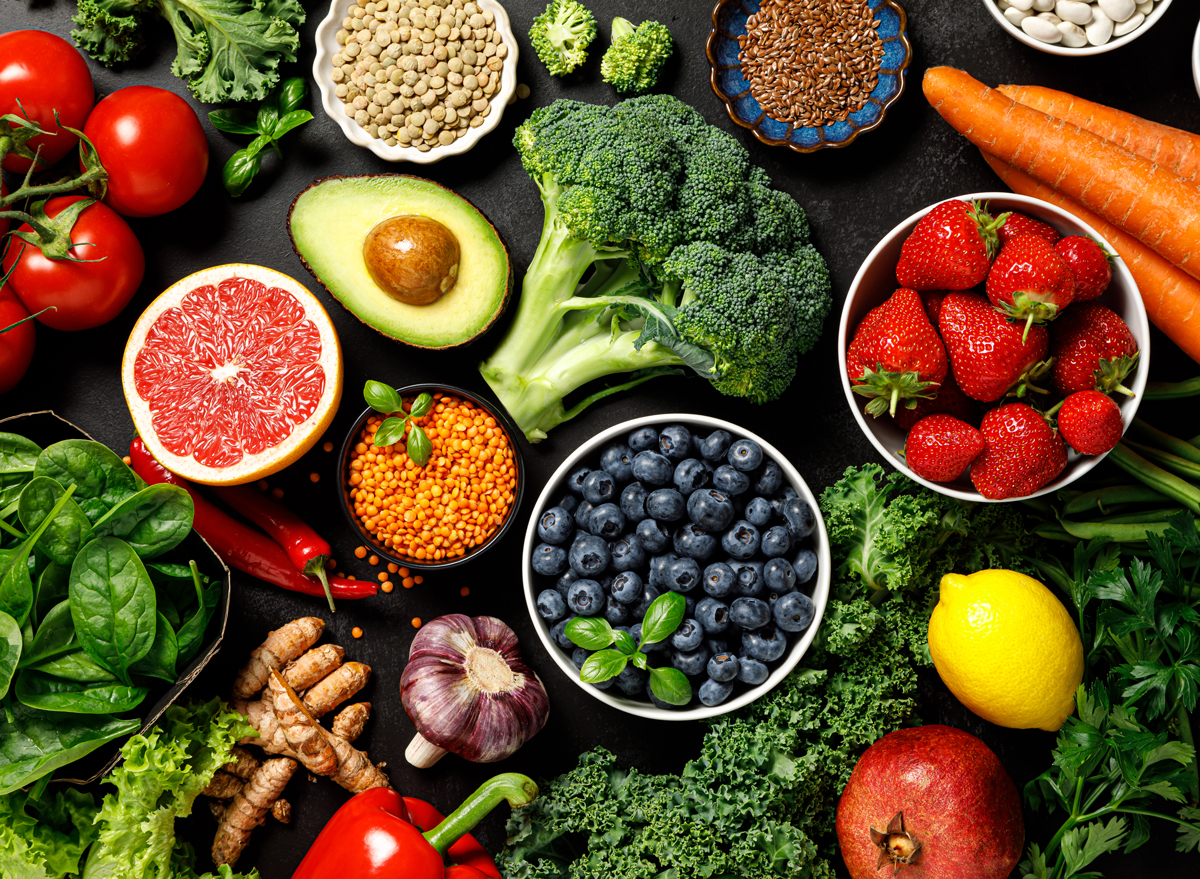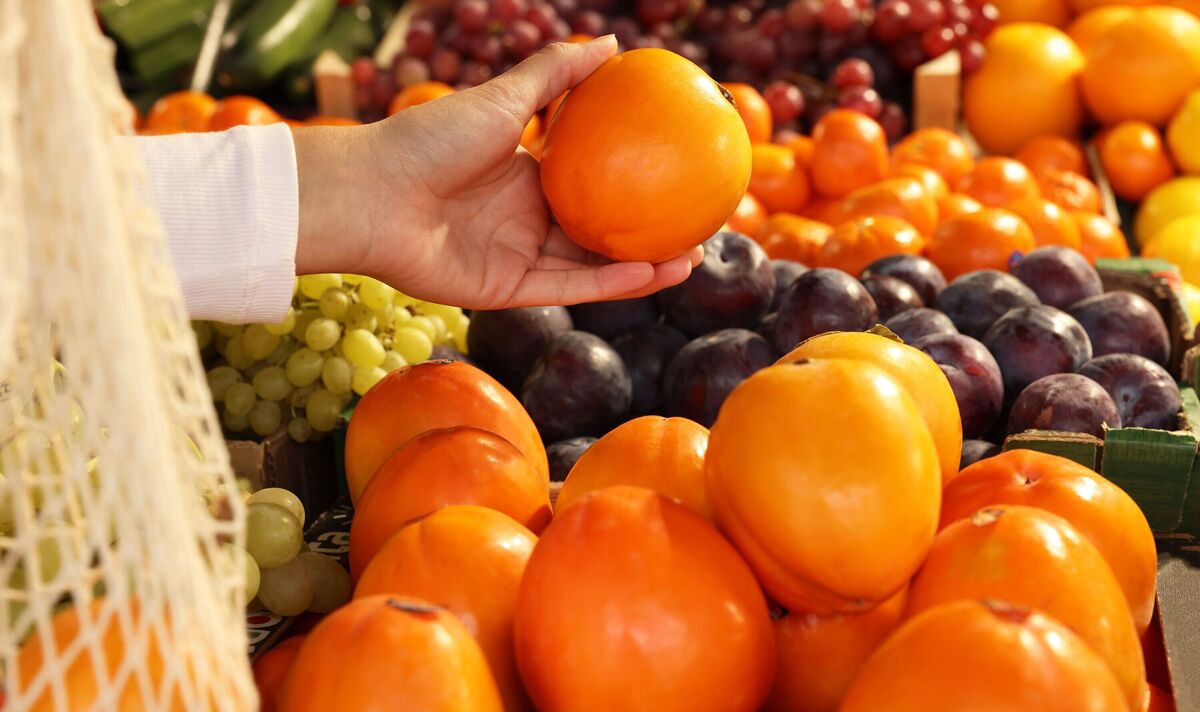Growing up, you were likely told ad nauseum to “eat your fruits and veggies.” So while you begrudgingly consumed mouthfuls of Brussels sprouts, you may have wondered, “Why are adults so obsessed with fruits and vegetables?” The answer is clear: they are among the healthiest foods in the world.
Fruits and vegetables are nutritional powerhouses that deliver an array of vitamins, minerals, fiber, antioxidants, and other essential nutrients vital for good health and longevity. Their health benefits include reduced risk of chronic disease (like heart disease, diabetes, and obesity), improved gut health and digestion, lowered inflammation, increased energy, and healthy weight management.
If you want to lose weight, adding more produce to your diet is non-negotiable. A 2020 study found that women who increased their intake of whole fruits and vegetables experienced healthy long-term weight loss, reduced risk of becoming overweight or obese, and were better able to portion control and slow their eating speed.
“Energy balance is one of the most important factors for those seeking weight loss,” says Gianna Masi, RDN, a registered dietitian with Barbend—in other words, we need to eat fewer calories than we burn. “Fruits and vegetables are so important when seeking weight loss because of how much volume they have while still being lower in calories. We can consume a larger bowl of fruit or vegetables and eat a higher volume of these foods [as compared to calorie-dense processed foods]. This factor can make dieting more enjoyable with the ability to consume larger amounts of foods.”
However, with so many delicious and nutritious options to choose from, it can be tricky to know which fruits and vegetables are best for weight loss. That’s why we chatted with Trista Best, RD, registered dietitian with Balance One Supplements and Masi, who share their wisdom on the best plants to add more of to your plate so you can shed pounds healthily and keep them off for good.
Read on to learn more, and when you’re done, check out 5 Eating Habits for Weight Loss and Muscle Gain, Experts Say.
Berries
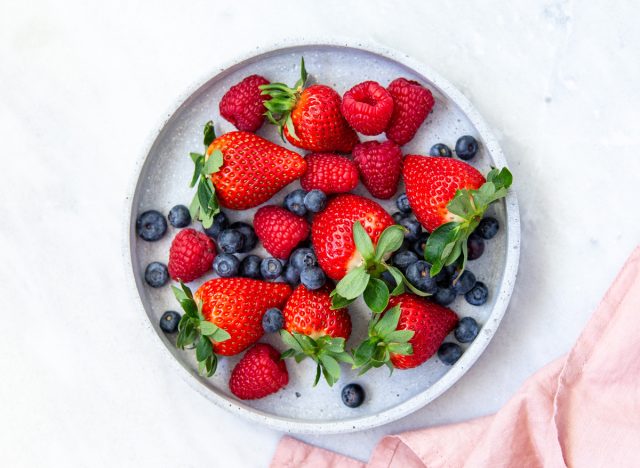
A top contender for reducing BMI is berries, according to a study published in Nutrients. In particular, blueberries are associated with the least amount of weight gain and reduced risk of obesity and type 2 diabetes. “Blueberries are a low-calorie, high-fiber food that may help with weight loss by helping you feel full and satisfied after eating. They’re also a good source of antioxidants and other nutrients that are important for overall health,” Best tells us.
Cruciferous vegetables
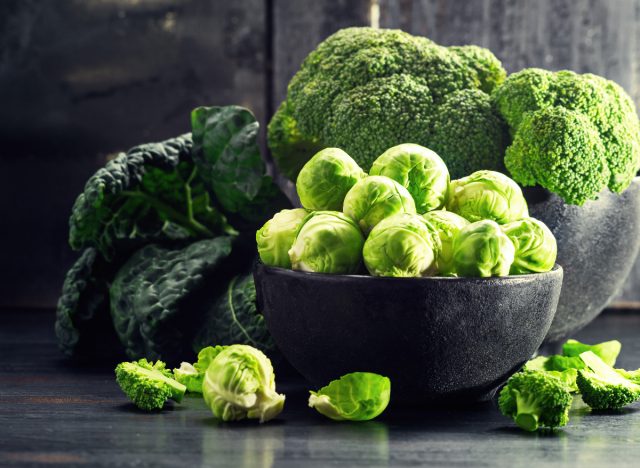
Cruciferous vegetables, such as broccoli, cauliflower, kale, and Brussels sprouts, are nutritional powerhouses that offer a myriad of health benefits. While they’re known mainly for their cancer prevention benefits, they’re also an excellent food for aiding in weight loss because they’re low in calories, high in fiber, and nutrient-dense.
“Cruciferous vegetables can aid in weight loss because, like most vegetables, they have a low-caloric density and a significant amount of fiber,” says Best. “These veggies contain powerful antioxidants known to lower cytokines and NF-kB, substances that drive the inflammation process. When these are abundant in the body and allowed to persist, dangerous levels of inflammation can be reached. This reduction in inflammation, along with feelings of satiety from the high fiber content, are helpful in the weight loss process.”
Avocado
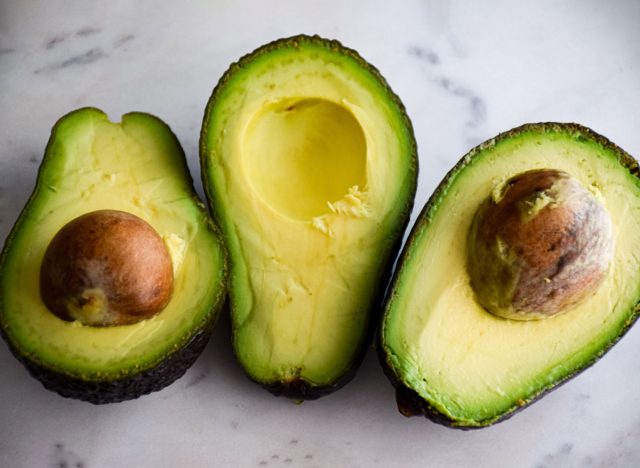
Though avocados are calorie-dense due to their high-fat content (fats provide nine calories per gram, as opposed to four calories per gram from protein and carbs), they’re a fantastic food for helping you reach your weight loss goals. According to the Adventist Health Study, a large cohort study of over 55,400 people, avocado consumption reduced the risk of becoming overweight or obese by 15 percent in high avocado consumers and 7 percent in low avocado consumers, compared to those who abstained from this delicious and nutritious fruit.
“While avocados are high in fat, the majority of the fat is monounsaturated fat, which is considered healthy. Increasing monounsaturated fat intake can help reduce body weight and waist circumference,” Best states.
Potatoes
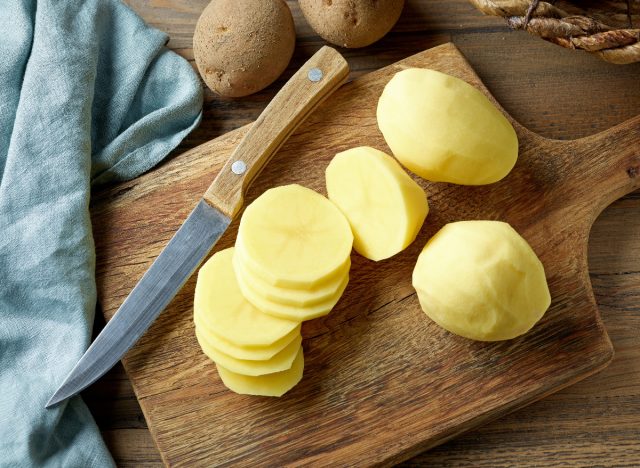
Potatoes often get a bad rap for being a high-carb food that doesn’t do any favors for weight loss. However, this unfair assumption is far from true. Potatoes are packed with nutrients, healthy carbs, and fiber, making them a healthy addition to any weight loss meal plan. In fact, the results of a 2021 study published in Nutrients found that potato consumption was associated with better diet quality, higher nutrient intake, and improved nutrient adequacy.
“Potatoes are low in calories while being high in fiber and other beneficial nutrients for weight loss,” says Best. “The calorie density of a boiled potato depends on the potato’s size and any toppings or condiments that are added. It’s worth noting that the calorie density of a boiled potato can vary depending on factors such as the variety of potato, cooking method, and any additional ingredients that are added. For example, adding butter or sour cream to a boiled potato will increase the calorie density.”
Cucumber
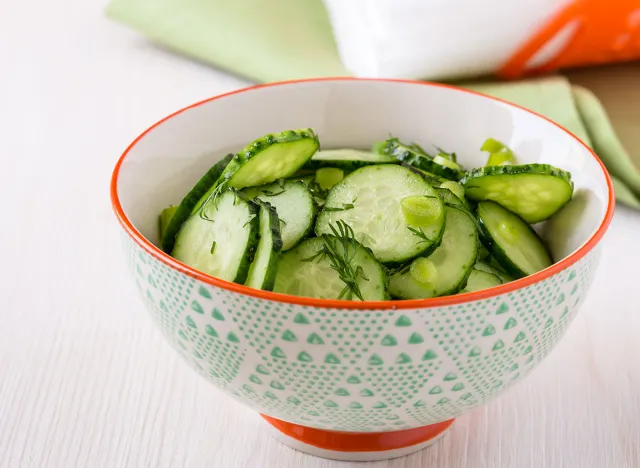
Cucumbers are a weight-loss-friendly snack. Comprised of 96 percent water and containing 45 calories per eight-inch cucumber, cucumbers provide hydration and a satisfying crunch. Plus, research suggests they’re an excellent source of antioxidants and vitamins that can boost overall health and help you shed extra pounds.
Watermelon
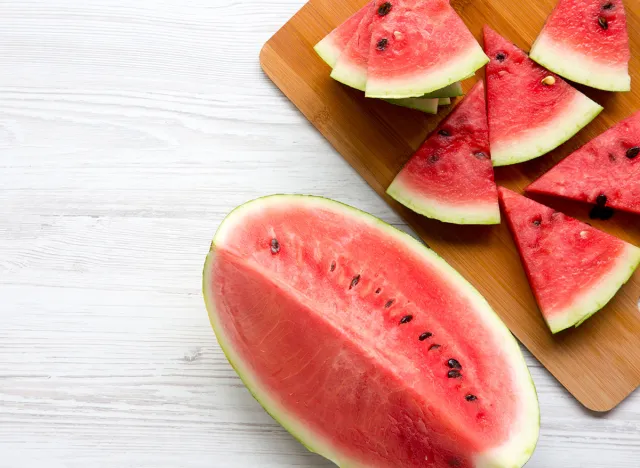
Watermelon is a mega-hydrating fruit and low in calories, making it a refreshing choice for weight loss. According to a 2019 study in Nutrients, eating watermelon can reduce body weight, body mass index (BMI), blood pressure, and waist-to-hip ratio. That’s because its high water content helps keep you full, while the natural sugars provide a satisfying sweetness without the added calories. Per the USDA, 100 grams of watermelon contains a mere 30 calories.
Celery
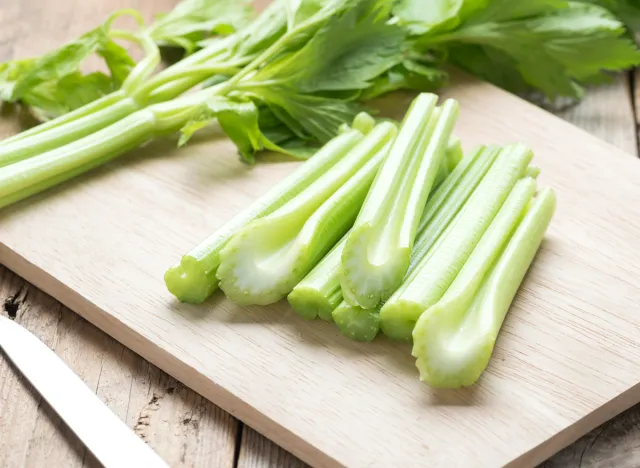
Celery is a staple for weight-conscious folks due to its low-calorie content and high water volume. According to a 2023 study in Food Science & Nutrition, participants who regularly consumed celery powder experienced significantly more weight loss than participants who had none. This crunchy vegetable is considered a “negative-calorie” food, meaning it takes more energy to digest than it adds. Per the USDA, 100 grams of celery contains 96 grams of water, 2 grams of fiber, and only 14 calories.
“Fiber keeps us fuller longer, which can help someone trying to achieve weight loss,” Masi explains. “Also, fiber keeps your bathroom habits regular and supports gut health.”
Peaches
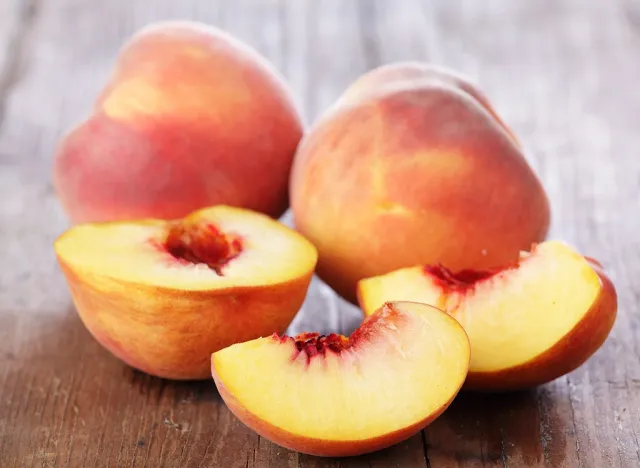
Peaches are a beloved juicy fruit whose natural sweetness offers a healthier alternative to sugary snacks. A single peach delivers 63 calories, 2 grams of fiber, and essential vitamins and antioxidants that improve your overall health and well-being while helping keep hunger at bay. Whether enjoyed fresh or added to salads, peaches are a delicious and nutritious addition to your weight-conscious diet.
Zucchini
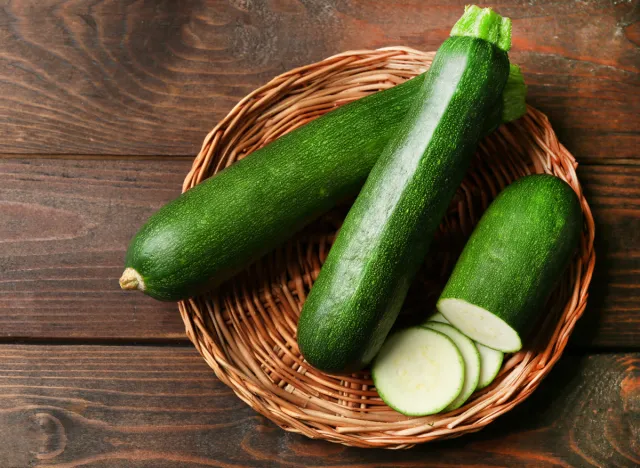
According to the USDA, zucchini is a versatile and low-calorie veggie, containing just 21 calories per 100 grams. With the skin on, zucchini adds fiber, aiding digestion and increasing satiety. A 2020 study found that eating nutrient-dense vegetables like zucchini, which are low in carbs and rich in vitamins and minerals, are excellent choices for healthy weight management.
Spinach
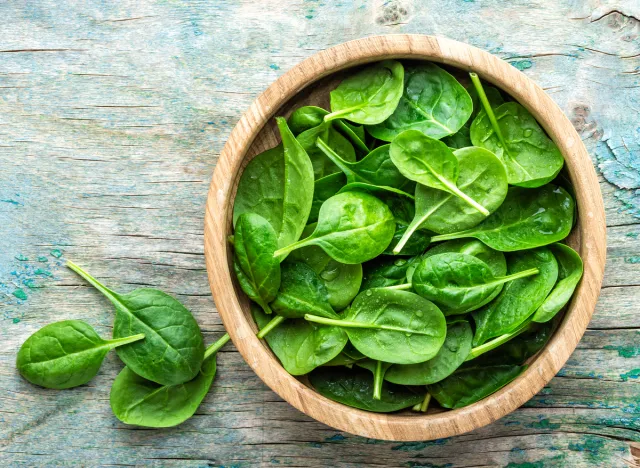
Spinach is a nutrient powerhouse that can aid in weight loss due to its low-calorie, high-nutrient, and water content. Per the USDA, a single cup of spinach contains 27 grams of water, 7 calories, and 1 gram of fiber. The fiber in spinach adds bulk to meals, which a 2023 study points out can aid weight loss by enhancing satiety, decreasing appetite, and reducing calorie intake.
Citrus fruit
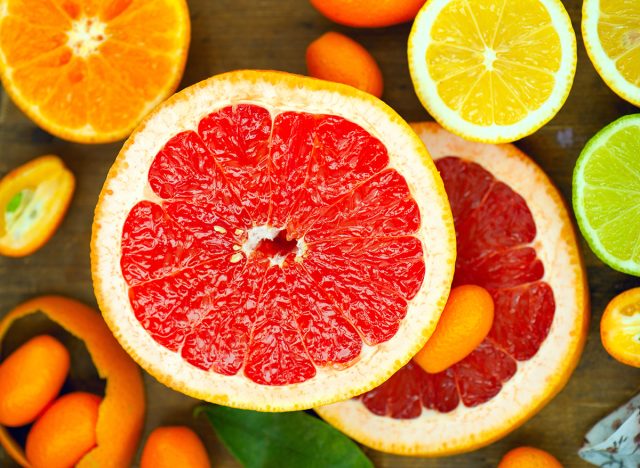
Citrus fruits—which include oranges, grapefruit, lemons, and limes—are some of the best fruits for weight loss.
In the Nutrients study, researchers found that citrus fruits like grapefruit were among the most effective produce foods for lowering participants’ body mass index (BMI). “Grapefruit can help with weight loss because it’s relatively low in calories and high in fiber, which can help you feel full and satisfied after eating,” says Best. “Grapefruit also contains a compound called naringenin, which has been shown to have anti-obesity effects in animal studies.”
Cantaloupe
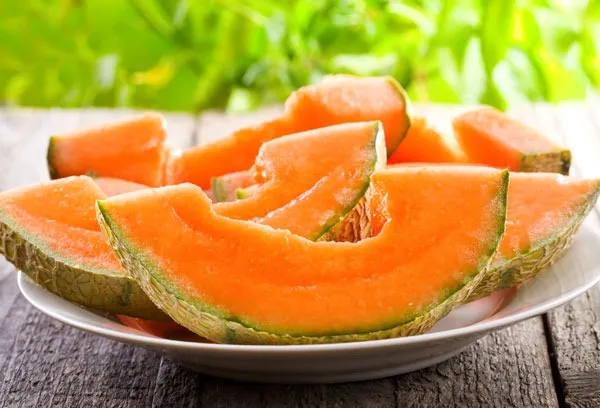
Cantaloupe is a sweet and delicious snack to aid your weight loss efforts. Its high water content aids in hydration and the fiber content (one gram of fiber per 100-gram serving) helps increase fullness and satiety. Additionally, recent research indicates cantaloupe can support your immune system by providing a healthy dose of vitamins A and C. Enjoying 100 grams of cantaloupe will deliver only 34 calories while filling up your belly with nutritious fuel.
Papaya
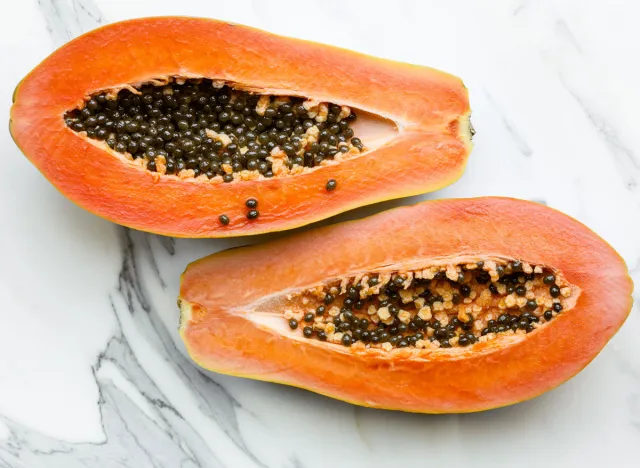
Low in calories and high in fiber, papaya enhances your sense of fullness while aiding in digestion. Per the USDA, 100 grams of raw papaya provides 43 calories and 2 grams of fiber. Additionally, papaya is a rich source of vitamins and enzymes such as papain that research shows can contribute to a healthy metabolism—your body’s calorie-burning engine.
Radishes
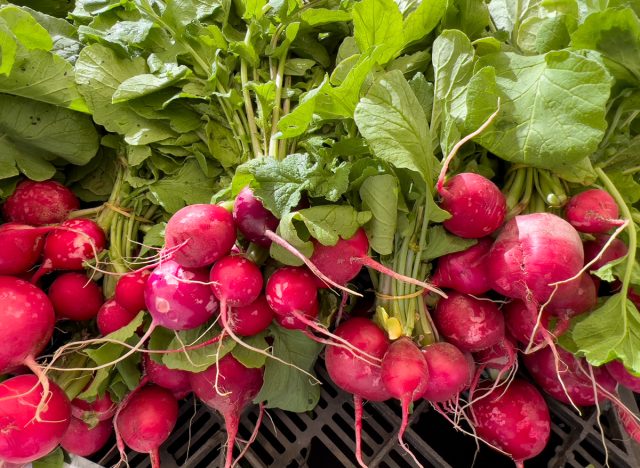
Radishes are a crisp and peppery vegetable that adds flavor and crunch to salads and snacks with minimal calories. Half a cup of sliced radishes contains only 9 calories and 1 gram of fiber. A 2021 study published in Trends in Food Science & Technology found that radishes’ high-fiber, low-carb qualities can increase feelings of fullness without adding excessive calories. They’re also an excellent source of vitamins and antioxidants to help keep your weight loss journey on track.
Plums
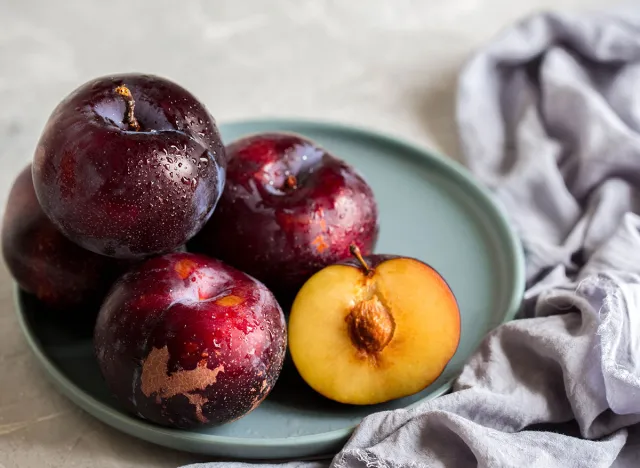
Plums are a sweet and satisfying fruit that can be included in your weight loss menu. With a single plum providing just 30 calories, 1 gram of fiber, and natural sugars, plums offer a healthier alternative to sugary snacks. Their fiber content helps boost digestive health and increase satiety, preventing overeating. According to a recent study in the Journal of Nutritional Science, plums offer additional health benefits such as reducing LDL (“bad”) cholesterol.

